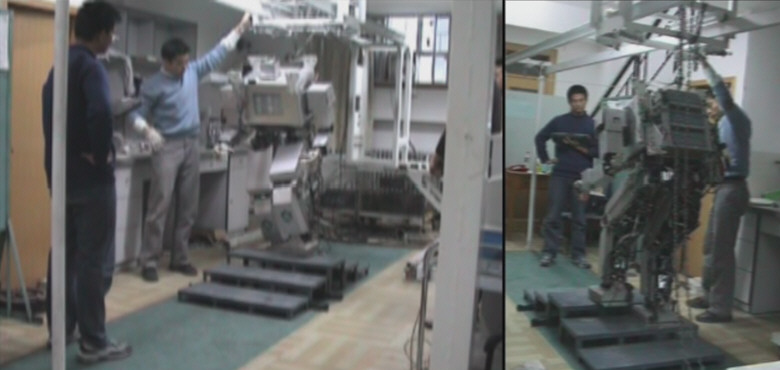From Rii
| Line 4: | Line 4: | ||
August 2000 to September 2003 | August 2000 to September 2003 | ||
| + | [[image:note_bulb.png|text-bottom|12px]] This work was done when Dr. Kai Xu was with [http://ime.pim.tsinghua.edu.cn/research/research33.html the Robotics & Automation Lab, Department of Precision Instrument and Mechanology, Tsinghua University] | ||
| - | [[image:Research_THBIP2000.jpg| | + | [[image:Research_THBIP2000.jpg|border]] |
| - | + | That was a China’s systematic effect developping humanoid technology. The THBIP-I robot had 27 independent DOF with a real-time distributed hierarchical control structure coordinating with the servo control, gait generation, gesture sensing, vision tracking and task planning subsystems. It was able to conduct autonomous walking using its on-board battery and manipulate small objects. | |
| - | That was China’s | + | |
| - | + | Dr. Xu was involved in mechanism design, gait generation algorithms, kinematics modeling, dynamics and vibration modeling, experimental validation, formulating real-time gesture compensation, task planning designed, etc. He also served as a coordinator, organzing meetings, experiments, progress documentation, etc. | |
| - | + | ||
Revision as of 01:32, 2 October 2010
Gait Generation and System Integration for the THBIP-I Humanoid Robot
August 2000 to September 2003
![]() This work was done when Dr. Kai Xu was with the Robotics & Automation Lab, Department of Precision Instrument and Mechanology, Tsinghua University
This work was done when Dr. Kai Xu was with the Robotics & Automation Lab, Department of Precision Instrument and Mechanology, Tsinghua University
That was a China’s systematic effect developping humanoid technology. The THBIP-I robot had 27 independent DOF with a real-time distributed hierarchical control structure coordinating with the servo control, gait generation, gesture sensing, vision tracking and task planning subsystems. It was able to conduct autonomous walking using its on-board battery and manipulate small objects.
Dr. Xu was involved in mechanism design, gait generation algorithms, kinematics modeling, dynamics and vibration modeling, experimental validation, formulating real-time gesture compensation, task planning designed, etc. He also served as a coordinator, organzing meetings, experiments, progress documentation, etc.
